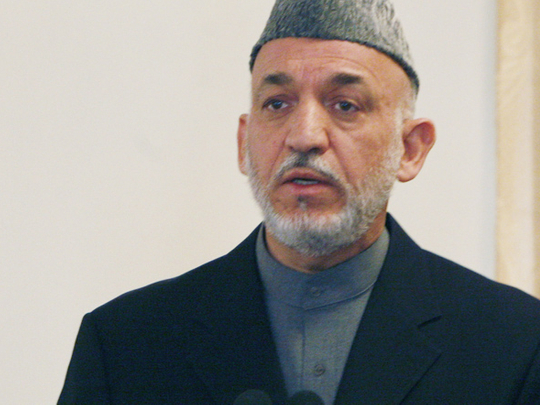
There is good news from Afghanistan: Last week, the parliament passed, and President Hamid Karzai signed, a much-improved election law that preserves the existence of an independent electoral complaints commission. Over the weekend, Karzai signed into law another measure, approved by parliament several weeks ago, outlining how the vote will be held. Many have feared that next year’s election would be held under deeply flawed presidential decrees. The election will be the most important Afghan political development of 2014 — and an inclusive and accountable election process needs active support now from the US and Nato.
The April election, which could be the first peaceful transfer of power in the history of Afghanistan, will be a major bellwether of success, or failure, in the US’ longest war. A reasonably successful election can help Afghanistan pull together for the difficult years after most US and international troops are withdrawn in 2014. A disputed election, however, can lead to ethnic and tribal fighting; a corrupt election will be a death knell for the US and foreign support for Afghanistan.
The most decisive factors are in Afghan hands: Will there be massive ballot fraud, as happened in 2009? Will fraud be violently challenged? The majority Pashtun population lives in the most violent areas; will it be afraid to vote? If so, the Pashtuns are likely to regard the outcome as illegitimate. Afghan politicians may fail to come together and have so many feuding candidates that decisive results will be difficult — which can lead to violence.
In Kabul, political energy is absorbed with pre-election bargaining, co-optation deals and a search for a “consensus” candidate. One of the first to declare his candidacy is Abdul Rasul Sayyaf, a Wahhabi scholar and a Pashtun warlord accused of severe human rights abuses. He is also a former speaker of the parliament, who several times has taken moderate positions and soothed potential crises. His contradictions — major human rights violator or potentially responsible politician? — are emblematic of Afghan politics and, perhaps, of outsiders’ inability to predict how any potential leader will govern. This also suggests why the US should not try to support a candidate of its liking or otherwise pick favourites even as it must strongly emphasise the need to improve Afghan governance.
While the US cannot guarantee an outcome, officials can take steps to promote broadly legitimate elections. The US Embassy and the US Agency for International Development are working with Afghan electoral bodies on procedural and technical matters. These actions are not well-known to Afghans or foreigners. Extensive and continuing publicity will emphasise America’s commitment to a successful election.
Enhanced security in eastern and southern Afghanistan is essential. Pakistan should be pressed to commit to moving heavy troop reinforcements to the Afghan border around the time of the election to diminish infiltration, as it did during Afghanistan’s 2004 presidential and 2005 parliamentary elections. Nato and the US should coordinate a high-profile approach to this effort.
The US should also plan limited troop reinforcements around the election. US troops are to be out of the combat mission by then, but a short-term increase of ground and air support, particularly helicopters, will add to the Afghan military’s ability to maintain security. The US troop withdrawal should not be run so much on autopilot that the defining political transition and the legitimacy of a democratic process are undercut.
The US should also support fielding international election observers, a request that the Afghan election commission, senior government officials and opposition politicians have all made. Security conditions will limit where observers can go. But with proper planning by international and Afghan security officials, observers can be present in all major population centres. Planning and early political work in coordination with other Nato governments are needed. The extensive civilian US Embassy staff should reinforce nongovernmental observers. Embassy staff who served in the provinces and have provincial ties to understand local political dynamics will provide analytical insight far greater than their numbers. Washington’s political fears of casualties post-Benghazi cannot be allowed to render America ignorant of what goes on in Afghanistan outside Kabul.
The Afghan election seems distant amid America’s domestic politics and crises in the Middle East. Yet, it will have a major impact on what becomes of 12 years of US sacrifice and expenditure. Publicity, coordination on Pakistan, limited troop reinforcements and fielding election observers will significantly increase the chances for a positive result. All of these measures will require time for decision-making, organisation and implementation. We need to get to work.
— Washington Post
Ronald E. Neumann was the US ambassador to Afghanistan from 2005 to 2007 and is the author of The Other War: Winning and Losing in Afghanistan. Vanda Felbab-Brown, a senior fellow at the Brookings Institution, is the author of Aspiration and Ambivalence: Strategies and Realities of Counterinsurgency and State-Building in Afghanistan.








